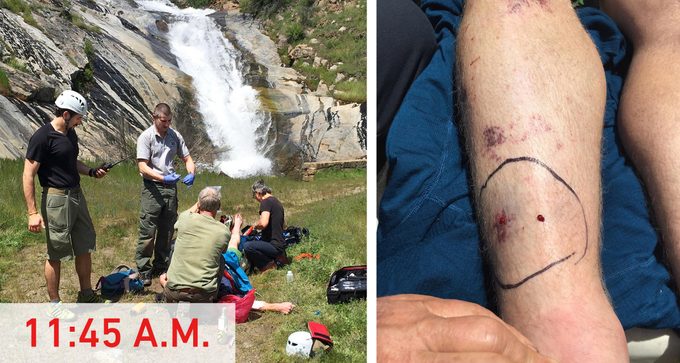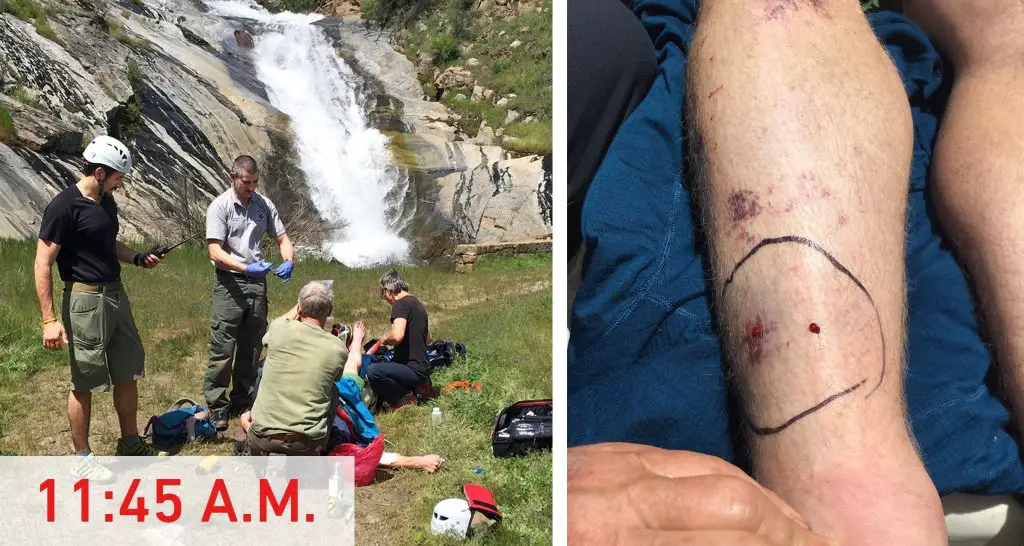Rattlesnakes are venomous reptiles that can cause serious harm to humans. If you are bitten by one, it’s important to seek medical attention immediately. But what if you’re in the wilderness and can’t get help right away? Can you survive a rattlesnake bite without treatment? Let’s find out.
In this article, we will explore the effects of rattlesnake venom on the human body, as well as the steps you can take to increase your chances of survival if you are bitten. We will also examine some of the myths and misconceptions surrounding rattlesnake bites, and provide you with the information you need to stay safe in rattlesnake country.
Surviving a rattlesnake bite without treatment is possible, but it’s not recommended. Rattlesnake venom can cause severe pain, swelling, and even death. If you’re bitten by a rattlesnake, seek medical attention immediately. In the meantime, try to stay calm and keep the affected area below heart level. Do not try to suck out the venom or use a tourniquet. These methods can actually make the situation worse.

Can You Survive a Rattlesnake Bite Without Treatment?
Rattlesnakes are venomous snakes found in many parts of the world. Their bites can be fatal if not treated immediately. In some cases, people may be unable to access medical attention right away, leaving them wondering if they can survive a rattlesnake bite without treatment. This article explores the question of whether you can survive a rattlesnake bite without medical help.
What Happens When a Rattlesnake Bites?
When a rattlesnake bites, it injects venom into the victim’s body. The venom can cause a range of symptoms, including severe pain, swelling, and bleeding. Some people may also experience nausea, muscle weakness, and difficulty breathing. In rare cases, the venom can lead to death.
If you are bitten by a rattlesnake, it is essential to seek medical attention as soon as possible. Even if you do not experience symptoms immediately, the venom can still be circulating in your body and causing damage.
Can You Survive a Rattlesnake Bite Without Treatment?
While it is possible to survive a rattlesnake bite without medical treatment, it is not recommended. Without treatment, the venom can spread throughout the body and cause serious damage to organs and tissues. In some cases, the damage may be irreversible, leading to long-term health problems or even death.
If you are bitten by a rattlesnake, it is important to seek medical attention right away. Treatment may include antivenom medication, which can neutralize the venom and prevent further damage to the body. Other treatments may include pain relief medication, wound care, and supportive measures to help the body fight off the effects of the venom.
What Are the Risks of Not Seeking Treatment?
If you do not seek medical attention after being bitten by a rattlesnake, you are putting yourself at risk of serious health problems. The venom can cause significant damage to the body, including damage to the heart, lungs, and kidneys. In some cases, the damage may be irreversible, leading to long-term health problems or even death.
In addition to the physical risks, there are also psychological risks associated with not seeking treatment. The fear and anxiety of not knowing whether you will survive can be overwhelming and can lead to long-term emotional trauma.
What Should You Do if You Are Bitten by a Rattlesnake?
If you are bitten by a rattlesnake, it is important to seek medical attention right away. Time is of the essence, and delaying treatment can increase the risk of serious health problems. Here are some steps you should take if you are bitten by a rattlesnake:
1. Call 911 or your local emergency services immediately.
2. Keep the affected area still and below the level of your heart.
3. Remove any tight clothing or jewelry from the affected area.
4. Do not apply ice, heat, or suction to the bite wound.
5. Do not attempt to capture or kill the snake.
What Are the Benefits of Seeking Treatment?
Seeking medical treatment after a rattlesnake bite can have many benefits. First and foremost, it can save your life. Antivenom medication can neutralize the venom and prevent further damage to the body. Other treatments, such as pain relief medication and wound care, can help to manage symptoms and promote healing.
In addition to the physical benefits, seeking treatment can also provide peace of mind. Knowing that you are receiving the best possible care can help to reduce anxiety and fear, which can be particularly important for those who may have experienced trauma from the snake bite.
Rattlesnake Bite: Treatment vs. No Treatment
When it comes to a rattlesnake bite, seeking treatment is always the best course of action. While it is possible to survive a rattlesnake bite without medical help, the risks are too great to take that chance. Seeking medical attention can provide life-saving treatment and peace of mind.
Here’s a comparison between treatment and no treatment:
| With Treatment | Without Treatment |
|---|---|
| Antivenom medication can neutralize the venom and prevent further damage to the body. | The venom can spread throughout the body and cause serious damage to organs and tissues. |
| Pain relief medication and wound care can help to manage symptoms and promote healing. | The damage may be irreversible, leading to long-term health problems or even death. |
| Peace of mind knowing that you are receiving the best possible care. | The fear and anxiety of not knowing whether you will survive can be overwhelming and can lead to long-term emotional trauma. |
In summary, it is never a good idea to take a chance with a rattlesnake bite. Seeking medical attention as soon as possible is the best course of action and can provide life-saving treatment and peace of mind.
Frequently Asked Questions
What happens if you don’t get treatment for a rattlesnake bite?
If you don’t get treatment for a rattlesnake bite, the venom can spread rapidly throughout your body. The venom can cause tissue damage, severe pain, and even death. Without treatment, the chances of surviving a rattlesnake bite are very low.
It’s important to seek medical attention immediately if you suspect you’ve been bitten by a rattlesnake. The longer you wait to get treatment, the more serious your symptoms may become.
What are the symptoms of a rattlesnake bite?
The symptoms of a rattlesnake bite can vary depending on the amount of venom injected and the location of the bite. Common symptoms include severe pain, swelling, and discoloration around the bite site. You may also experience nausea, vomiting, and difficulty breathing.
If you’ve been bitten by a rattlesnake, it’s important to seek medical attention immediately. Even if you don’t have any symptoms, it’s still possible for the venom to spread throughout your body and cause serious damage.
How do you treat a rattlesnake bite?
If you’ve been bitten by a rattlesnake, it’s important to seek medical attention immediately. The treatment for a rattlesnake bite typically involves antivenom medication, which can help to neutralize the venom and prevent further damage.
In some cases, you may also need to receive supportive care, such as pain relief medication and intravenous fluids. It’s important to follow your doctor’s instructions carefully and to avoid any activities that could worsen your symptoms.
Can you die from a rattlesnake bite?
Yes, it’s possible to die from a rattlesnake bite if you don’t receive prompt medical attention. The venom from a rattlesnake bite can cause tissue damage, organ failure, and even death if left untreated.
If you’ve been bitten by a rattlesnake, it’s important to seek medical attention immediately. The longer you wait to get treatment, the more serious your symptoms may become.
How can you prevent a rattlesnake bite?
There are several ways to prevent a rattlesnake bite, including wearing long pants and boots when hiking in areas where rattlesnakes are common. You should also avoid sticking your hands or feet into areas where you can’t see, such as rock crevices or tall grass.
If you do encounter a rattlesnake, it’s important to give it plenty of space and to back away slowly. Don’t attempt to handle or capture the snake, as this can increase your risk of being bitten.
How to Survive a Rattlesnake Bite | National Geographic
In conclusion, while it may be possible to survive a rattlesnake bite without treatment, it is not recommended. The risk of serious complications, including tissue damage, organ failure, and even death, is high. Seeking medical attention as soon as possible is the best course of action in the event of a rattlesnake bite.
Additionally, prevention is key when it comes to avoiding rattlesnake bites. Wearing protective clothing, such as boots and long pants, when hiking or spending time in areas where rattlesnakes are known to live can greatly reduce the risk of an encounter. Being aware of your surroundings and listening for the sound of a rattlesnake can also help prevent bites.
Overall, while surviving a rattlesnake bite without treatment is possible, it is not worth the risk. Seeking medical attention promptly and taking steps to prevent encounters with rattlesnakes are the best ways to avoid serious harm.


